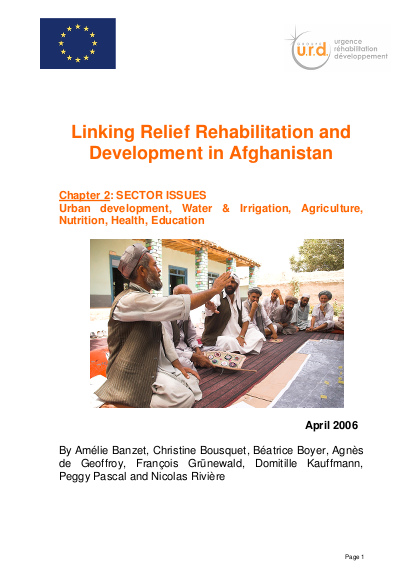
During the three-week mission, the LRRD team travelled extensively in different provinces. 1.3.1 Objectives and methodology Main objectives of this three-week field mission were to: - Develop a thorough understanding of the evolution of aid interventions and strategies; (see report on cross cutting issues) - Identify common trends and relevant issues and analyse them from a cross sector perspective; (see report on cross cutting issues) - Identify the current opportunities and challenges pertaining to each sector; (presented in this report) - Stimulate debate with agencies and key stakeholders through a workshop organised at Groupe URD’s office in Kabul on 24 April 2006. Data collection was based on a qualitative approach: - Before the mission, each expert reviewed relevant available documents; - A common analysis framework was elaborated prior to the field trip - Regular meetings gathering all team members took place during the field trip to crosscheck information and share preliminary findings, and to analyse crosscutting issues and multi-sector comparisons - Interviews with national and local authorities, donors, aid workers from local and international NGOs, representatives from the UN, ICRC and the private sector were conducted in Kabul and the different provinces visited; ensuring a balanced representation of the different stakeholders; - Visits to a number of projects took place enabling the team to make their observations.
Resource collections
- UN Habitat - Urban Response Collection
- Urban Response - Urban Crisis Preparedness and Risk Reduction
- Urban Response Collection - Community Engagement and Social Cohesion
- Urban Response Collection - Economic Recovery
- Urban Response Collection - Environment and Climate Change
- Urban Response Collection - Housing, Land and Property
- Urban Response Collection - Urban Crisis Response, Recovery and Reconstruction
- Urban Response Collection - Urban Resilience